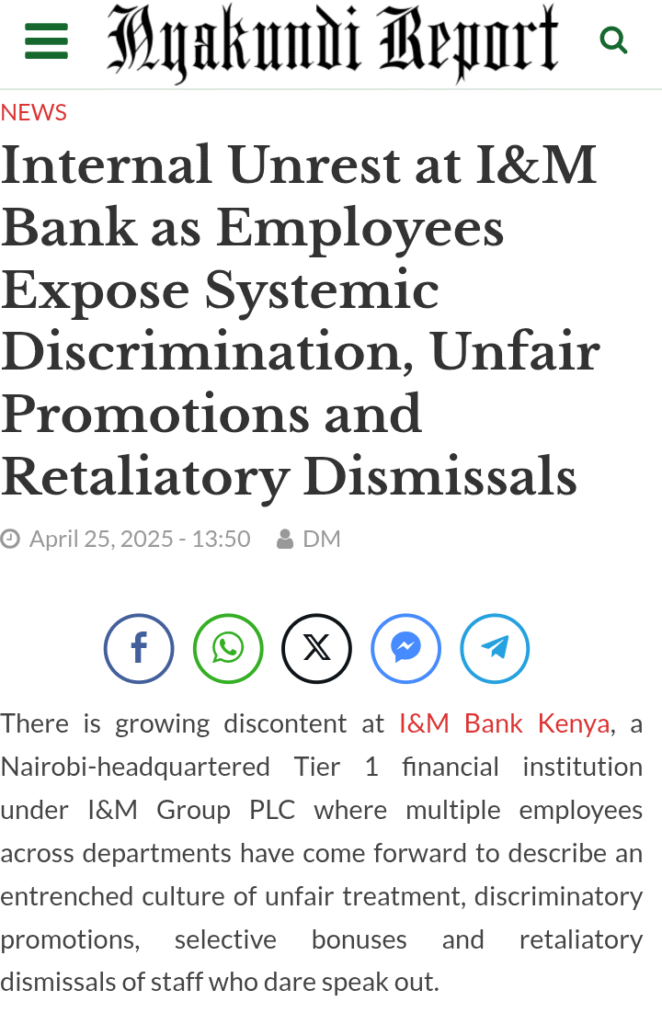I&M Bank Kenya, one of the country’s well-known financial institutions, is currently facing serious internal challenges, as many employees have come forward with troubling stories of discrimination, unfair promotions, biased bonuses, and retaliatory dismissals.
These employees paint a picture of a toxic work environment, where things like career progression, promotions, and bonuses are not based on merit but on favoritism and personal connections.
The frustration among staff members stems from the fact that promotions at I&M Bank often seem to have little to do with an employee’s performance or experience. According to several employees, it’s more about who you know or which ethnic group you belong to.
This has led to situations where underqualified staff are promoted to senior roles while more experienced and competent employees are overlooked. The latter end up training these new, less qualified supervisors, which leaves them feeling frustrated and undervalued. It’s hard not to see why many feel stuck in a system where real skill and effort don’t seem to matter much.

The bank’s bonus distribution also fuels discontent. Employees say that some people receive bonuses worth months of their salary, while others, despite contributing just as much to the bank’s success, receive much smaller bonuses or none at all. It’s a clear case of inequality that many employees believe reinforces the idea that rewards are handed out based on personal connections, not performance.
In an attempt to reduce the high turnover rate caused by these issues, I&M Bank increased the resignation notice period for managerial staff from one month to three months.
While this may seem like a strategic move to hold on to experienced staff, many view it as an attempt to trap them in a toxic environment, making it harder for them to leave without significant consequences.
Another problem that staff have raised is the way promotions are handled. Employees who are moved into higher roles often find that their salaries don’t match the responsibilities that come with those roles.
They’re told that their salaries will be adjusted over the course of three years, yet they are expected to take on the full workload from the moment they step into the new position. This practice has led many to feel that the bank is exploiting their efforts, especially when combined with rising workloads and expectations.
There are serious concerns about discrimination, particularly when it comes to hiring and promotions. Several staff members claim that Kenyans who have held leadership roles for extended periods are being replaced by expatriates from India, despite having proven their capabilities.

These expatriates, they say, are often less familiar with the local operations and rely on their Kenyan colleagues to handle the work, all while being promoted and given contract extensions beyond retirement age something Kenyan employees are not afforded.
Discrimination isn’t limited to nationality. Employees also point to systemic issues of racism, tribalism, and sexism within the bank’s culture. There are claims that recruitment and promotions often bypass the formal process, with people being appointed to senior roles based on personal ties rather than skills or experience.
This, according to staff, leads to inefficiencies in operations and customer complaints.The situation came to light after one employee tried to expose these issues by sending out an internal email.
Instead of seeing any changes, the employee was dismissed in what others believe was a retaliatory move, sending a clear message to the rest of the staff: speak up, and you will face consequences. This has fostered a culture of fear, where employees are afraid to voice their concerns for fear of losing their jobs.
Despite efforts by the new CEO, Gul Khan, to address these problems, many employees say that resistance from senior management is making it difficult for real changes to take place.
This toxic culture, if not addressed, could have long-term consequences not just for the bank’s workforce but for its reputation and overall success. I&M Bank’s current challenges highlight the importance of creating a fair, transparent, and merit-based workplace.





















Add Comment